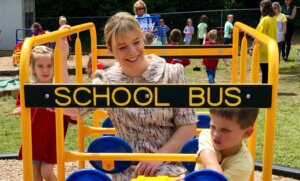Montgomery, Ala. — For the tenth year in a row, Alabama’s state-funded, high-quality and voluntary First Class Pre-K program was named the nation’s highest quality pre-kindergarten program.
Today’s announcement was made by the National Institute for Early Childhood Education, which annually ranks state pre-k programs for quality based on ten measures. Alabama’s voluntary pre-k program is one of only six state programs in the nation to meet or exceed all ten NIEER benchmarks, and only the second state to do so for ten consecutive years. Alabama’s First Class Pre-K program is managed by the Alabama Department of Early Childhood Education.
The Alabama School Readiness Alliance and its Pre-K Task Force, which advocates for the expansion of Alabama’s First Class Pre-K program, applauded today’s announcement while pointing out that too many families who want to enroll their four-year-old in the program still lack access to a classroom in their community.
“We congratulate state leaders and Alabama First Class Pre-K teachers for building and maintaining the nation’s highest-quality pre-k program,” said Bob Powers, president of The Eufaula Agency and the co-chair of the Alabama School Readiness Alliance. “It takes a strong commitment from everyone involved to reach this milestone for ten consecutive years.”
“The quality of Alabama’s First Class Pre-K program is producing real results,” said Mike Luce, vice chairman of the Harbert Management and the co-chair of the Alabama School Readiness Alliance Pre-K Task Force. “According to the Public Affairs Research Council of Alabama, First Class Pre-K alumni consistently outperformed their peers in reading and math in every grade level studied, through the sixth grade. These results reinforce and validate our belief that expanding Alabama’s First Class Pre-K program is not only the right thing to do, but the smart thing to do.”
The NIEER quality benchmarks include:
Comprehensive early learning standards;
Pre-k teachers have a bachelor’s degree;
Pre-k teachers have specialized early childhood training;
Assistant pre-k teachers have a Child Development Associate (CDA) credential;
Teachers participate in a substantial number of hours of professional development;
Maximum class size is 20 or fewer;
Staff to child ratio is 1:10 or less;
Children receive screening, referral and support services for vision, hearing, dental, health and other support areas;
Children are provided meals and/or snacks;
Systems hold individual classrooms accountable and monitor to ensure quality standards are being met.
The ASRA Pre-K Task Force consists of 51 prominent leaders from the business, education, civic, medical, legal, philanthropic, military and child advocacy communities. The task force is in year four of its ten-year campaign to advocate for full funding for the First Class Pre-K program by the 2022-2023 school year. The task force estimates that a total level of funding of $144 million is needed to ensure every family that wants to enroll their four-year-old in a First Class classroom will be able to do so.
Last month, the Alabama State Legislature approved a historic $16 million expansion of the states pre-kindergarten program. Along with funding from year two of Alabama’s four-year federal Preschool Development Grant, the $16 million increase would help open approximately 155 additional classrooms and help enroll approximately 2,800 more four-year-olds than the current school year. This should increase the total number of students in the program to approximately 14,500 four-year-olds statewide. The percentage of Alabama four-year-olds enrolled will increase from 20 to 25 percent.
The Alabama Department of Early Education is expected to announce new First Class Pre-K classroom grants next week. Registration is still underway for many existing First Class classrooms. A list of existing classrooms, with phone numbers, can be found here: http://children.alabama.gov/uploadedFiles/File/Copy_of_Baseline_Program_Listing.pdf. Parents should contact their local First Class site(s) directly for registration details.
For more information on NIEER’s State of Preschool 2015 yearbook and detailed state-by-state breakdowns on quality benchmarks, enrollment, and funding, please visit, http://nieer.org/sites/nieer/files/2015%20Yearbook.pdf. The Alabama School Readiness Alliance advocates for the expansion of high-quality, voluntary pre-kindergarten. ASRA works to ensure that pre-k is a continuing priority for Alabama’s children, parents, community leaders, legislators and governing officials. ASRA is a collaborative effort of A+ Education Partnership, Alabama Giving, Alabama Partnership and VOICES for Alabama’s Children. Visit www.alabamaschoolreadiness.org to learn more.







